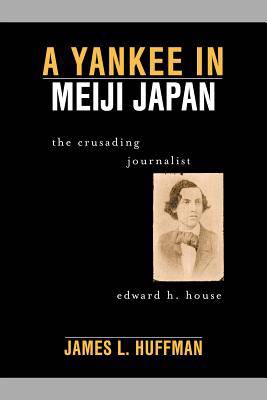
- Retrait gratuit dans votre magasin Club
- 7.000.000 titres dans notre catalogue
- Payer en toute sécurité
- Toujours un magasin près de chez vous
- Retrait gratuit dans votre magasin Club
- 7.000.000 titres dans notre catalogue
- Payer en toute sécurité
- Toujours un magasin près de chez vous
A Yankee in Meiji Japan
The Crusading Journalist Edward H. House
James L Huffman
Livre relié | Anglais
125,95 €
+ 251 points
Format
Description
This unique book introduces nineteenth-century Japan through the compelling life story of Boston journalist Edward H. House (1836-1901), America's first regular correspondent in Japan. House's accomplishments were breathtaking in variety: shaping the reputations of John Brown and Mark Twain, influencing American attitudes toward Asia, persuading Congress to return a massive indemnity to Japan, editing Tokyo's earliest English-language newspaper (Tokio Times), constructing a powerful case against imperialism, and introducing Western orchestral music to Japan. House's experiences also illustrated many of the era's key themes: Japan's use of public relations as a diplomatic tool, the contentious relations of the expatriate community, the role foreign advisors played in Japan's drive toward modernity, and the complicated nature of U.S.-Japan relations. The book captures the human drama of a special breed of early journalist. It recounts the bohemianism that made House and his friends (e.g., Walt Whitman, Artemus Ward) notorious. It narrates his tender, tortured relationship with Aoki Koto, a girl he adopted when she was on the verge of suicide. It shows a courageous struggle with gout, including 20 years in a wheelchair given to him by the powerful Okuma Shigenobu. And it details a deep friendship with Mark Twain, which eventually was destroyed by a dispute over The Prince and the Pauper. Twain's unpublished 50-page manuscript on the experience, Concerning the Scoundrel E. H. House, is introduced here for the first time. Meticulously researched, the book draws on House's voluminous writings and on hundreds of letters between House and major figures in both America and Japan, including Mark Twain, U.S. Grant, John Russell Young, Edmund Clarence Stedman, Okuma Shigenobu, and Inoue Kaoru. With its lively, accessible prose and seamless interweaving of the life of House with the history of the Meiji era, this book will be welcomed by students, scholars, and general readers interested in modern Japanese history and in America's nineteenth-century foreign relations.
Spécifications
Parties prenantes
- Auteur(s) :
- Editeur:
Contenu
- Nombre de pages :
- 328
- Langue:
- Anglais
Caractéristiques
- EAN:
- 9780742526204
- Date de parution :
- 28-04-03
- Format:
- Livre relié
- Format numérique:
- Genaaid
- Dimensions :
- 153 mm x 236 mm
- Poids :
- 557 g







